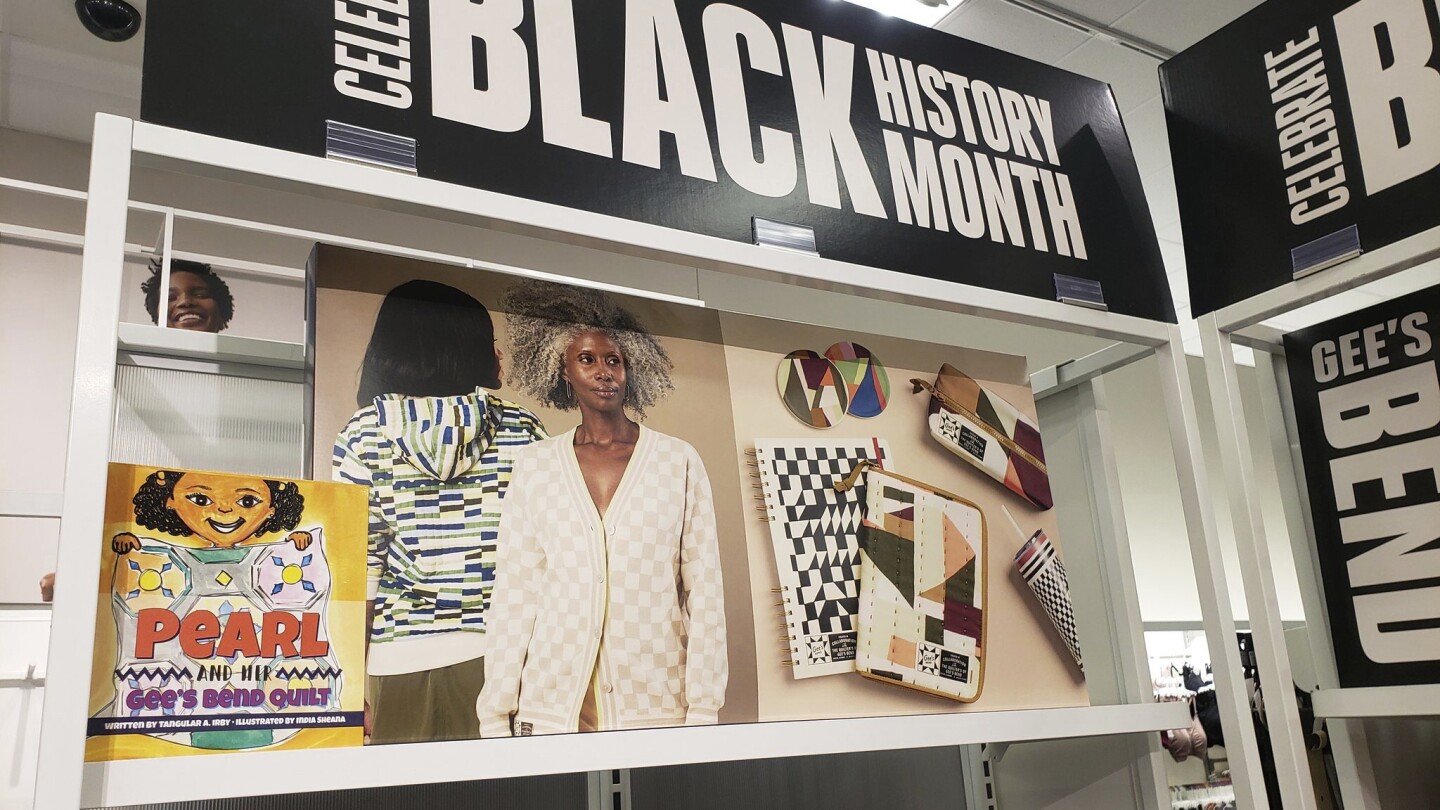Over the past two decades, Gee’s Bend quilts have captured the public’s imagination with their kaleidoscopic colors and their daring geometric patterns. The groundbreaking art practice was cultivated by direct descendants of slaves in rural Alabama who have faced oppression, geographic isolation and intense material constraints.
As of this year, their improvisational art has also come to embody a very modern question: What happens when distinctive cultural tradition collides with corporate America?
Enter Target. The multinational retailer launched a limited-edition collection based on the quilters’ designs for Black History Month this year. Consumer appetites proved to be high as many stores around the country sold out of the checkered sweaters, water bottles and faux-quilted blankets.
Unlike the pay structure of the Freedom Quilting Bee of the 1960s — an artist-run collective that disbursed payment equitably to Gee’s Bend quilters, who were salaried and could set up Social Security benefits — one-off partnerships with companies like Target benefit only a small number of people, in this case five women from two families.
You lay all of the blame on Target and act like they stole the designs and that they weren’t licensed them. Target didn’t pillage someone’s cultural heritage, someone sold their cultural heritage to a corporation. If they valued it so much, why would they do that? You cant complain that your heritage was stolen when you willingly sold it away. Your beef is with the designer, NOT Target.
Because they did steal the designs. They gave the quilters a pittance and made a fortune off of it without giving them a share. I would have considered that theft if it were my designs.
From the article:
The Target designs were “inspired by” five Gee’s Bend quilters who reaped limited financial benefits from the collection’s success. They received a flat rate for their contributions rather than pay proportionate to Target’s sales. A spokesperson for Target wouldn’t share sales numbers from the collection but confirmed that it indeed sold out in many stores.
Furthermore:
Unlike the pay structure of the Freedom Quilting Bee of the 1960s — an artist-run collective that disbursed payment equitably to Gee’s Bend quilters, who were salaried and could set up Social Security benefits — one-off partnerships with companies like Target benefit only a small number of people, in this case five women from two families.
And why did those quilters accept that fee? Because they were living in poverty.
After all, the average annual income in Boykin, Alabama, is still far below the poverty rate at about $12,000, according to the nonprofit Nest.
They took advantage of poor people by offering them a lump sum and then reaped the benefits exponentially more.
And to rub salt in the wounds:
While thumbnail-size photos of the makers appeared on some marketing materials and the text “Gee’s Bend” was printed on clothing tags, the company’s engagement with the quilters was limited. As soon as Black History Month ended, the quilters’ names and images were scrubbed from the retailer’s site.
They didn’t even give these people recognition after one month. Despite this being a very important part of their local culture, which went back to when they were slaves.
The whole thing stinks and you should not be defending it.
Exactly, it’s easy to have principles with a full stomach
Maybe I scanned that article too quickly. Did they say how much money the 5 artists agreed upon for the collab, or how much profit Target made from it?
No. Do you think what those artists got paid came even close to the profits Target made on the designs of theirs that Target both altered and removed the history from?
I’m a professional product designer and I have worked with Target. Target has been one of the better companies I have worked with. That said, I’d have to see the numbers to make a call on whether or not I thought they got a fair shake in the licensing deal that they agreed to.
As for the history element, I’m on the fence. On one hand, the cheaper manufacturing and blander colors are not representative of the original work. On the other hand, they take inspiration from the original work, are getting more people to look into the quilting movement, and they will probably generate increased demand for the originals.
This reminds me a lot of when a big studio pushes a musical act that is a more commercial version of something that’s in an indie scene. On one hand, the people from the indie scene get super pissed at the blander, more commercial, act. On the other hand, more people usually start to dig into the music scene that inspired the commercial act. And indie acts from the original scene finally start making a buck and getting noticed more.
This reminds me a lot of when a big studio pushes a musical act that is a more commercial version of something that’s in an indie scene. On one hand, the people from the indie scene get super pissed at the blander, more commercial, act.
This is far more egregious than that in my opinion, since this is an art form directly linked to slavery. This is an art started by their enslaved ancestors, and which they continue in their memories.
In the music biz, people get mad at the broke artist who decides to make a buck from licensing their shit to a corporation. In the quilting biz, people get mad at the corporation for approaching the artist in the first place.
Quilting in general is a very personal art form. Devoted quilters put a lot of thought and care into their designs and the fabric they use. They can tell you what it all means when you ask.
The very idea of mass-produced “traditional” quilts is spitting on the whole idea of quilting.
But what the hell, we have mass-produced Navajo rugs, right?
What happens when distinctive cultural tradition collides with corporate America?
Corporations have a fiduciary obligation to maximize profit for shareholders. That is the primary reason for their existence. It is not to meet a need, promote well being, or respect cultural traditions, it’s only to maximize profit. If in the pursuit of maximum profits a corporation does end up meeting some need or promoting well being, it is incidental. Popular theory is that the companies that best meet their consumers needs will also be the most profitable, but reality is much more complicated than that and this theory often doesn’t hold up, which is unfortunate because it is the basis for our entire economic system. We have built our entire economic system on the idea that the pursuit of profit should be the highest ideal. I think we can now say conclusively that was a mistake.
They have a fiduciary responsibility to honor shareholders trust. Not necessarily to maximize profits.
It certainly seems that in the vast majority of cases, shareholders feel their trust is best honored when profits are maximized, and that their trust is violated when profits are insufficient.
From Target (pronounced tar-jhay) - the company who thought that Canadian shoppers were mirror images of their American counterparts but were wrong, because in less than 2 years they were wiped off the map in Canada.
Target’s difficulty in Canada had more to do with logistics and existing trucking routes than anything else. They assumed they could push Canadian governments to allow for the creation of new carrier contracts, but they were wrong, and as a result their supply chain was immediately hamstrung.
The stores in Canada had a harder time getting goods, which caused the company to raise prices accordingly. Images of the stores show many empty shelves, which doesn’t encourage shopping. Canadian consumers weren’t without other options locally, and those shoppers on the US border found it easier and more advantaged to cross over and shop at Target stores in the US should they have a need.
Still their stupidity at assuming anything vs sitting down with the gov’t and hammering out a deal.
It was hubris, nothing more.
Given their stance on pride I think we dodged a bullet - and several larger non-perishable retailers have collapsed recently… now if only we could get more grocers up here.








